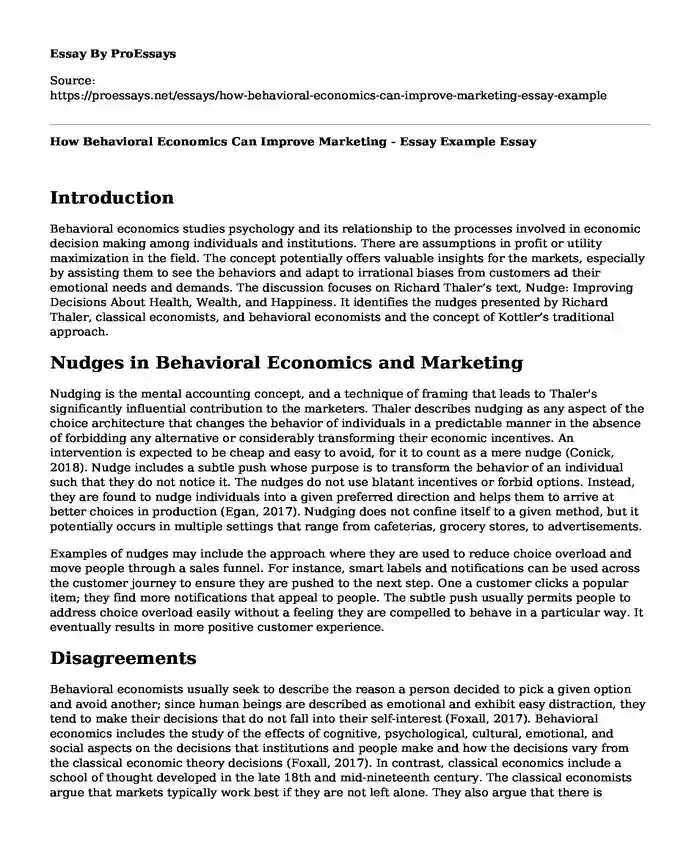Introduction
Behavioral economics studies psychology and its relationship to the processes involved in economic decision making among individuals and institutions. There are assumptions in profit or utility maximization in the field. The concept potentially offers valuable insights for the markets, especially by assisting them to see the behaviors and adapt to irrational biases from customers ad their emotional needs and demands. The discussion focuses on Richard Thaler’s text, Nudge: Improving Decisions About Health, Wealth, and Happiness. It identifies the nudges presented by Richard Thaler, classical economists, and behavioral economists and the concept of Kottler’s traditional approach.
Nudges in Behavioral Economics and Marketing
Nudging is the mental accounting concept, and a technique of framing that leads to Thaler's significantly influential contribution to the marketers. Thaler describes nudging as any aspect of the choice architecture that changes the behavior of individuals in a predictable manner in the absence of forbidding any alternative or considerably transforming their economic incentives. An intervention is expected to be cheap and easy to avoid, for it to count as a mere nudge (Conick, 2018). Nudge includes a subtle push whose purpose is to transform the behavior of an individual such that they do not notice it. The nudges do not use blatant incentives or forbid options. Instead, they are found to nudge individuals into a given preferred direction and helps them to arrive at better choices in production (Egan, 2017). Nudging does not confine itself to a given method, but it potentially occurs in multiple settings that range from cafeterias, grocery stores, to advertisements.
Examples of nudges may include the approach where they are used to reduce choice overload and move people through a sales funnel. For instance, smart labels and notifications can be used across the customer journey to ensure they are pushed to the next step. One a customer clicks a popular item; they find more notifications that appeal to people. The subtle push usually permits people to address choice overload easily without a feeling they are compelled to behave in a particular way. It eventually results in more positive customer experience.
Disagreements
Behavioral economists usually seek to describe the reason a person decided to pick a given option and avoid another; since human beings are described as emotional and exhibit easy distraction, they tend to make their decisions that do not fall into their self-interest (Foxall, 2017). Behavioral economics includes the study of the effects of cognitive, psychological, cultural, emotional, and social aspects on the decisions that institutions and people make and how the decisions vary from the classical economic theory decisions (Foxall, 2017). In contrast, classical economics include a school of thought developed in the late 18th and mid-nineteenth century. The classical economists argue that markets typically work best if they are not left alone. They also argue that there is nothing but the government’s smallest role. The theory firmly holds to a robust belief in a free market’s efficiency to produce economic development (Nachane, 2018).
Marketing Research
The new marketing approach can be applied in business to develop a marketing strategy based on human behavior. The influence of Richard Thaler on behavioral science has been significant. The results continue to shape economic, health, and business strategies and compel people to perceive outcomes from a more human viewpoint. The nudge concept helps in making the right decisions as it offers a system to make both simple and sophisticated decisions (Conick, 2018). Marketing research is thus enhanced as it does not focus on human experiences alone. Thaler and Sunstein maintain that there is a false assumption that nearly all individuals, nearly all the time, they will make choices entirely in their best interest (Thaler, 2018). In marketing, the focus should be expanded to include human behaviors that push them towards a decision or choice without their notice.
Conclusion
The novel focus on human behaviors is a crucial aspect that business should focus on while developing marketing strategies. Customer experiences are a good approach to develop a strategy, although they are insufficient in that they do not attract customers or revenue. Marketing is witnessing a transformation towards new focus areas such as human behaviors, and understanding ways to use new knowledge to influence customers, and attract them.
References
Conick, H. (2018). How Behavioral Economics Can Improve Marketing.
https://www.ama.org/marketing-news/read-this-story-to-learn-how-behavioral-economics-can-improve-marketing/
Egan, M. (2017). Nudge: Improving decisions about health, wealth and happiness. CRC Press.
Foxall, G. R. (2017). Behavioral economics in consumer behavior analysis.
https://doi.org/10.1007/s40614-017-0127-4
Kotler, P., Kartajaya, H., & Setiawan, I. (2016). Marketing 4.0: Moving from traditional to digital. John Wiley & Sons.
Nachane, D. M. (2018). New Classical Economics and Real Business Cycle Theory. In Critique of the New Consensus Macroeconomics and Implications for India (pp. 61-81). Springer, New Delhi. https://link.springer.com/chapter/10.1007/978-81-322-3920-8_3
Thaler, R. H. (2018). Nudge, not sludge.
Cite this page
How Behavioral Economics Can Improve Marketing - Essay Example. (2023, Dec 12). Retrieved from https://proessays.net/essays/how-behavioral-economics-can-improve-marketing-essay-example
If you are the original author of this essay and no longer wish to have it published on the ProEssays website, please click below to request its removal:
- Case Studies on Global Business Management
- Essay Example on Life Comes at You Fast: How Billboard Ads Catch My Attention
- Tech Transforming Financial & Banking: Secure Payments, Efficiency & Quality - Essay Sample
- Global Governance: Current Debate & Future Prospects - Research Paper
- Essay on Apple Inc: Tech Giant in Fiercely Competitive Consumer Electronics Market
- Essay Example on Inclusive Learning: An Integral Part of Modern Learning Culture
- Capitalist Economic System Compatibility with the Buddhist Economics - Paper Example







